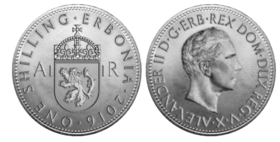Pound marten: Difference between revisions
(→Coins) |
No edit summary |
||
| Line 16: | Line 16: | ||
| subunit_ratio_3 = {{frac|4}} | | subunit_ratio_3 = {{frac|4}} | ||
| subunit_name_3= Farthing | | subunit_name_3= Farthing | ||
| symbol = £ | | symbol = £ | ||
| symbol_subunit_1 = / or ∫ | | symbol_subunit_1 = / or ∫ | ||
| Line 38: | Line 36: | ||
==Coins== | ==Coins== | ||
Coins have traditionally been minted by a number of private moneyers, working under charter from the King. | Coins have traditionally been minted by a number of private moneyers, working under charter from the King. By the 19th century, the main coins in circulation were 1/4d, 1/2d, 1d, 3d, 6d and 12d. A coin of 60d or 5/- known as the quarter was also infrequently seen, minted for commemorative purposes. By 1942, the so-called 'crown' of two shillings, and half quarter of two shillings sixpence put into general circulation. Since 1934, only the Royal Mint, the Royal Hambrian Mint and the City Mint are authorised to mint coins. | ||
All coins ever minted in denominations of the pound marten since the Resizing in the early 19th century are legal tender and most still circulate through the economy. There are approximately £2,000 million coins in circulation. | |||
===Reverse designs=== | |||
Reverse designs have been mostly standard since 1903 with the redesign for the accession of Edmund IX. They are, however, periodically resculpted by new sculptors. The present designs are: | |||
* 1/4d: St Laurence taming the Hart | |||
* 1/2d: St Christopher bearing the Christ Child | |||
* 1d: St Edmund the King with Orb and Sceptre | |||
* 3d: Three crowned lions passant in chase | |||
* 6d: Six strawberries erupting from a coronet | |||
* 1/-: Crowned royal escutcheon | |||
* 2/-: Royal crown with roses, hareslips and gooseberry blossoms | |||
* 2/6: Royal coat of arms with supporters | |||
* 5/: Varies (commemorative) | |||
* £1: Cross crosslet trefly with crowned lions and floral emblems | |||
{{Great Nortend}} | {{Great Nortend}} | ||
[[Category:Great Nortend]][[Category:Astyria]] | [[Category:Great Nortend]][[Category:Astyria]] | ||
Revision as of 04:48, 15 November 2019
| Pound marten | |
|---|---|
 A typical silver coin with a denomination of one shilling, showing the reverse and obverse. | |
| ISO 4217 | |
| Unit | |
| Symbol | £ |
| Denominations | |
| Subunit | |
| 1⁄20 | Shilling |
| 1⁄12 | Penny |
| 1⁄4 | Farthing |
| Symbol | |
| Shilling | / or ∫ |
| Penny | d |
| Demographics | |
| User(s) | |
The pound marten (symbol: £) is the national currency of Great Nortend. It is subdivided into 20 shillings (symbol: / or ∫) and 240 pennies (plural: pence; symbol: d). The issuance of the currency is strictly controlled by His Majesty's Treasury, in conjunction with the King's Bank of Cadell.
The specific epithet marten distinguishes the pound marten from other currencies either historically or presently named the pound. It derives from the martlet, a heraldic symbol, used by the House of Anthord which is depicted as a hallmark on all Erbonian silver coins owing to their content of marten silver. Marten silver is a highly restricted alloy of silver used specifically for coinage purposes, being made up of 11 parts silver with 1 part copper.
Coins
Coins have traditionally been minted by a number of private moneyers, working under charter from the King. By the 19th century, the main coins in circulation were 1/4d, 1/2d, 1d, 3d, 6d and 12d. A coin of 60d or 5/- known as the quarter was also infrequently seen, minted for commemorative purposes. By 1942, the so-called 'crown' of two shillings, and half quarter of two shillings sixpence put into general circulation. Since 1934, only the Royal Mint, the Royal Hambrian Mint and the City Mint are authorised to mint coins.
All coins ever minted in denominations of the pound marten since the Resizing in the early 19th century are legal tender and most still circulate through the economy. There are approximately £2,000 million coins in circulation.
Reverse designs
Reverse designs have been mostly standard since 1903 with the redesign for the accession of Edmund IX. They are, however, periodically resculpted by new sculptors. The present designs are:
- 1/4d: St Laurence taming the Hart
- 1/2d: St Christopher bearing the Christ Child
- 1d: St Edmund the King with Orb and Sceptre
- 3d: Three crowned lions passant in chase
- 6d: Six strawberries erupting from a coronet
- 1/-: Crowned royal escutcheon
- 2/-: Royal crown with roses, hareslips and gooseberry blossoms
- 2/6: Royal coat of arms with supporters
- 5/: Varies (commemorative)
- £1: Cross crosslet trefly with crowned lions and floral emblems
